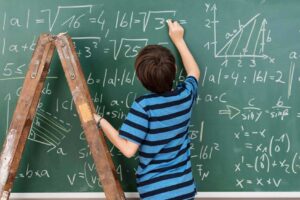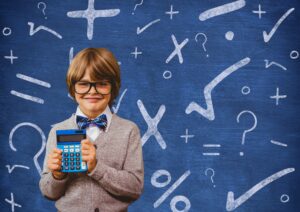Other people’s successes are always a bit of a mystery. Why are some people able to solve complex mathematical problems including identify fourths, while others, no matter how hard they try, cannot reach the next level? Is it really true that not everyone can do math? Nazar Agakhanov, Chairman of the Central Mathematics Subject-Methodological Commission of the All-Russian School Olympiad, answered these questions. Since 1995 he led the Russian national team at international math Olympiads.
In 2010 Nazar Khangeldyevich became a laureate of the Russian Federation Government Prize in the field of education for his scientific and practical development of “The System of Development of the All-Russian Subject Olympiads for Schoolchildren, Selection and Preparation of Russian National Teams for the International Olympiads in Physics and Mathematics”. When mathematical abilities appear, how to develop them and who should not go to the Olympiad movement – told the expert.
Mathematical ability is the ability to build new models that do not repeat the standard algorithms including about measuring length with objects taught at school. Science and technology are built on the basis of such small discoveries. This is why mathematics makes it possible to find gifted children.
Some scientists believe that ab

out 10% of people have high mathematical ability. And that’s normal. If there’s no math talent, it means there’s something else. It’s important to help children discover interesting areas, but not to impose them.
“Every parent wants their child to grow up to be a successful person, and the position that you have to develop from diapers is now very popular. Maybe this is true, but in any case it is better to start from a sincere interest of the child. Talent will die if you force it to do something that is not natural. Often parents want to use any opportunity, in particular, for example, send mental arithmetic, falsely believing that it is a step into mathematics, but it’s a pointless waste of time, because mathematics – is creativity. It’s not for nothing that problems and solutions are called beautiful,” says Nazar Agakhanov.
Most often the propensity for mathematics begins to show in elementary school, but this does not mean that immediately need to take a child to several clubs and intensively develop these abilities. One lesson about measuring using an inch ruler of engaging math per week is enough.
More serious circles begin with students in grades 5-6. At this stage of the study of mathematics to overtake his peers is very easy. The range of tasks is quite narrow and the possession of the methods of their solution allows them to surpass even potentially stronger peers precisely due to knowledge, but further, in grades 7-8, for high results need to feel the math, and here are the mathematical abilities. At this time teachers work with the student to develop a mathematical apparatus, which is already strengthened in high school.
It is not uncommon, therefore, for those students who are exceptionally strong in grades 5-7 to start losing their edge in high school, and to burn out from not understanding why they can no longer be as strong as others. Although the burnout may be due to another reason – too long study of the Olympiad problems. Interest should be maintained by switching to other activities.
Character and Will: What Helps You Succeed at Olympiads
Hard work and the willingness to work hard are probably the most obvious qualities that are needed in any field to achieve great results.
“Abilities are the foundation. You have to work hard to move up a few notches. With those two points and a good teacher as well, everything else goes into the background. Even the family atmosphere and financial well-being. Kids who are not well provided for in their families often make the National Team. You can even draw the conclusion that the more comfortable the home, the less inclined the child is to work,” says Nazar Agakhanov.
Another important point that every Olympiad athlete should work on is psychological stability. At the Olympiad the excitement can make the child show a result worse than its potential. It is more evident in sports when a child fails when coming to international competitions. You need to be able to perceive the competition not as a competition where you have to overcome incredible challenges, but as the pleasure of meeting interesting problems and trying to solve them. It’s hard to develop psychological resilience on your own. The environment is important for that.
“Think about it, why are there so many high-performing kids in good math schools? First, of course, the best schools gather the best teachers. Second, in competition with your peers, you get used to it – you have to prove you’re the best. A few times at first you may lose your temper because of excitement, but then you will be calm,” says Nazar Agakhanov.
Interested in everything: tips for effective Olympiad training
If a young mathematician goes to the Olympiad movement only to get into university, it is better to leave this venture behind. According to the expert, the number of budget places in Russia definitely exceeds the number of capable kids graduating from school. There is no problem with a child being talented in math and not wanting to be taken to university. Such kids pass their exams with ease. Again, this factor absolutely does not work for math.
Perhaps you have to sincerely love competition, in order to survive the possible stress. And a teacher will help you discover your abilities and become better. You can study with teachers both online and offline. But the expert is sure that online forms will not replace face-to-face communication.
“What matters is not the amount of material covered, but how the teacher listened to the child’s solution and reasoning. This is why preparations for international olympiads in all countries are about the same – the teacher helps to sort out errors, rather than reading out lectures. A pupil can see solutions to thousands of problems and it doesn’t help him or her to get ahead, but if he or she goes deep into the question, tries to solve it, sees the difficult parts, new knowledge will be revealed to him or her. Distance forms, unfortunately, are not so effective in this, because it is important to have a live dialogue and direct conversation. Moreover, the place of residence is not a cross to success. There are good teachers in the regions, and this is a fact,” says Nazar Agakhanov.
Another opportunity to improve your skills is a variety of tournaments and summer schools, which exist in almost every region. You can pick out the most suitable ones for yourself. Such sites gather a large number of children from different cities in one place, give the opportunity to communicate, solve problems together, and get acquainted with the teachers who are on the jury.
Another important point on the way to effective training – time to rest. Sports, walks, and outdoor activities ar

e good tools for a quality reset between classes. But it’s not the only one.
“A large number of discoveries in mathematics happen at the intersection of disciplines, when you can switch, transfer your abilities to another direction in which you are not an expert of the highest level. So if you want to achieve something serious in mathematics, you should be interested in all subjects at school and develop yourself in all areas,” says Nazar Agakhanov.
Hence the question arises, if you spend time on other interests, then how much time should be devoted to mathematics? There is no specific answer here, everything is very individual. The formula will help you develop an inner feeling – you need to practice just enough to feel that you are in shape. And before the Olympiad rounds it is important not to overload the brain with too intensive exercises, so as not to get tired.
Pay attention: the most common mistakes of beginner olympiadists
Many novice olympiadists make mistakes because they do not think through the solution in depth. Most often this happens because of inattention and ignoring part of the conditions. That is why Nazar Agakhanov recommends, no matter how trivial it might sound, to read problem conditions in detail and use all marked parameters in the solution.
In the solution of geometric problems most often encountered are logical errors, when what needs to be proved is somehow embedded in the logic of the solution. Example: you need to prove the equality of angles. A student starts with the phrase “since these angles are equal”, solves the problem and falls into a logical trap, making incorrect conclusions.
A common mistake in algebra and combinatorics is the long brute-force solution instead of the short one. Solving by brute force is a normal approach, but if some case is missed, the solution may not count because that is where the correct solution was.